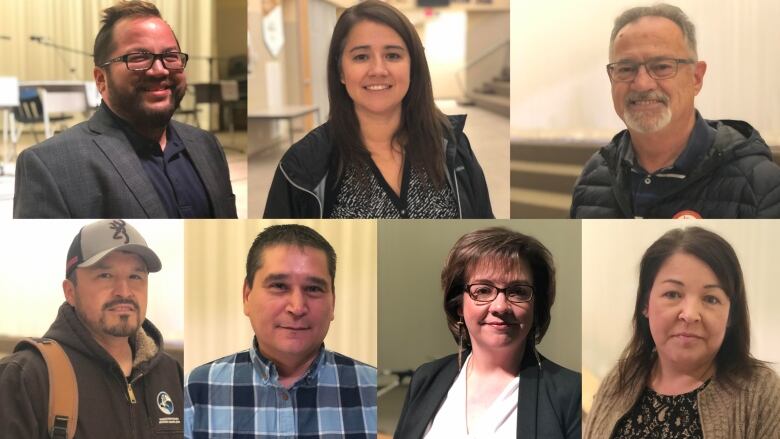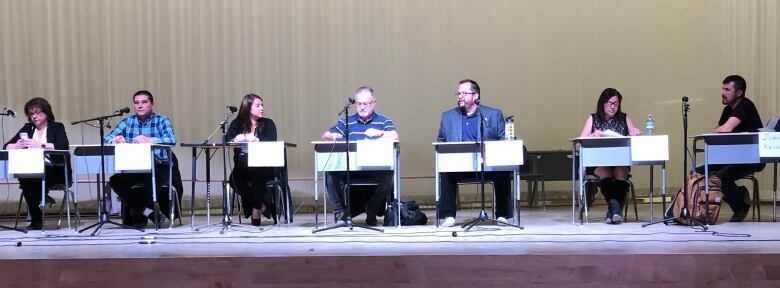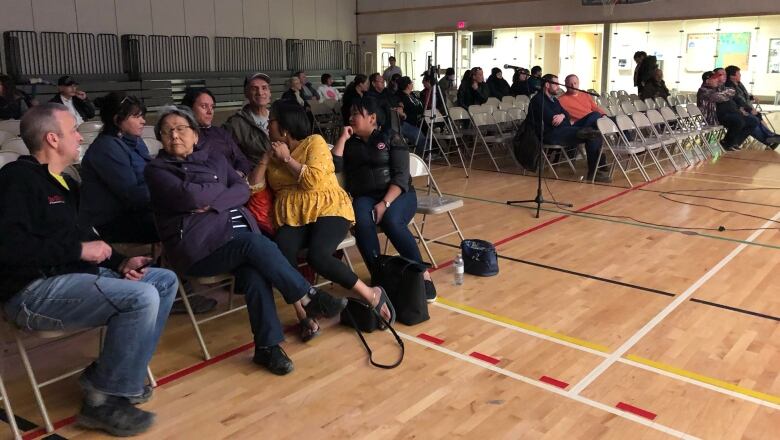Candidates vent frustration at N.W.T. government in Inuvik candidates forum
Housing and community's relationship to Yellowknife became focus of debate organized by climate group

The only all-candidates forum in Inuvik, N.W.T., brought out the policy wonks in the community's MLA hopefuls Thursday night, but failed to establish a clear front-runner among a slate of experienced candidates.
Seven candidates from the town's two ridings traded policy and programming ideas great and small, from using tiny homes to address a housing shortage, to a "major restructuring" of government.
The forum, organized by local advocacy group Climate Action Inuvik, brought together Inuvik Twin Lakes candidates Sallie Ross, Lesa Semmler, and Donald Hendrick with Inuvik Boot Lake candidates Dez Loreen, Eugene Rees, Diane Thom, and Jimmy Kalinek.
Both races lack an incumbent, as Robert C. McLeod, incumbent in Twin Lakes, and Alfred Moses, incumbent in Boot Lake, decided not to seek re-election on Oct. 1.
- Here's acomplete list of all candidatesrunning for MLA
- Read more about candidates' platforms in Boot Lake and Twin Lakes
- Want more coverage of the 2019 N.W.T. election? Find it here|NWT VOTES
More than 60 people gathered at East Three Secondary School for the debate. Over the course of nearly three hours, that crowd dwindled by a third.
Dissatisfaction with territorial government
In many cases, candidates' answers pointed to a dissatisfaction with the territory's status quo.
Candidates criticized the centralization of services in Yellowknife, including nursing programs that are no longer offered at Aurora College's campus in Inuvik.
They also bemoaned the lack of regulations tailored to local needs.
"They want to pass a law that they say will work for the whole Northwest Territories," said Kalinek, an outfitter and former wildlife manager with the territory. "Every community is different."

Since 2008, Inuvik Twin Lakes has been represented by a cabinet minister, Robert C. McLeod, who oversaw more than a half dozen portfolios, including Municipal and Community Affairs.
In 2015, Inuvik's other MLA, Alfred Moses, joined cabinet as well, managing the the portfolioof Education, Culture, and Employmentand, later, housing.
But according to the candidates, having an MLA at the highest level of government has not helped the community advance its agenda.
Sports fields still on hold, 15 years later
Emblematic of the relationship, candidates said, are the still-unbuilt soccer field and baseball diamond promised by the territorial government 15 years agowhen the East Three Secondary School was built.
The territory has offered the town $450,000 to build the field, based on an estimate made more than a decade ago. The town says it would cost more than double that now.
We need to get off our backsides when we get to Yellowknife.- Eugene Rees, Inuvik Boot Lake candidate
"Fifteen years is a long time," said Thom, a chief negotiator for the Inuvialuit Regional Corporation who has a background in community development. "There must be some underlying reason why there is such a delay."
But others were less understanding.
"It's not only the ball field," said Kalinek. "There's a lot of other promises that have been broken."
In response to a question about bureaucratic delay in Yellowknife, Semmler, who has worked for the territorial government and the IRC, said the problem is weak leadership.
"Sometimes, the ministers are not pushing the [deputy ministers] as the leader," Semmler said.
"You've got a [deputy minister] coming from the East Coast, or Alberta and they're tweaking what they brought with them ... It doesn't fit."

Rees agreed.
"The people of Boot Lake are tired of people saying, 'I'm sorry, those are the rules and we can't help you,'" said Rees, a born-and-raised Newfoundlander who has lived in Inuvik for 15 years.
"We need to get off our backsides when we get to Yellowknife, and make some of these bureaucrats understand that the way it's been is not good enough."
Housing top of mind for candidates
Much of the forum's discussion time was taken up with economic issues, including the need for economic diversification.
Candidates criticized the N.W.T.government'sinadequate funding for apprenticeship programs, and its failure to push the federal government to open oil and gas development in the region.
Alot of people [are] sleeping in storage rooms with no windows.- Dez Loreen, Inuvik Boot Lake candidate
Beyond the economy, a major focus was a housing shortage currently affecting the community.
As of 2016, almost one in 12 residents were on a waiting list for public housing. Most are waiting for single-person units.
Loreen, a town councillor, said "homeless[ness] is an issue ...Alot of people [are] sleeping in storage rooms with no windows."
Several times throughout the evening, Loreen proposed the construction of tiny homes as a solution.
- Read about theother ridingswe're watching in this election
- Learn more about the candidates in your riding with our candidate tracker
- Find our latest coverage of the campaign here |NWT VOTES
"I want to see people get a sense of ownership over their own housing ... because when you have that pride, that's when you see people building up," said Loreen.
Ross, who works as a regional manager for the territory's income assistance program, said Loreen's program could be used as a training opportunity.
"We're in need of certified carpenters, and we know that we're in need of single-person dwellings," she said. "I think that Dez's idea of tiny homes is a fabulous solution."
Climate not focus of climate forum
Despite being organized by climate activists, climate change was a secondary discussion during the forum.
Most of the candidates spoketo the need to increase solar power generation and improve the resilience of existing infrastructure.
Hendrick, a highway transport officer with the territorial government, said building the Mackenzie Valley Highway should be a priority for the next assembly.












_(720p).jpg)


 OFFICIAL HD MUSIC VIDEO.jpg)
.jpg)



























































































